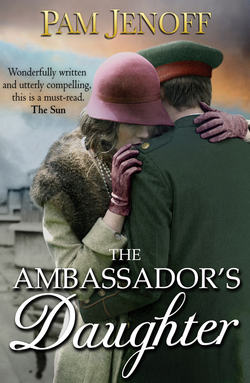Читать книгу The Ambassador's Daughter - Pam Jenoff, Пэм Дженофф - Страница 8
PROLOGUE
ОглавлениеThe sun has dropped low beneath the crumbling arches of Lehrter Bahnhof as I make my way across the station. A sharp, late-autumn breeze sends the pigeons fluttering from the rafters and I draw my coat closer against the chill. The crowds are sparse this Tuesday evening, the platforms bereft of the usual commuter trains and their disembarking passengers. A lone carriage sits on the track farthest to the right, silent and dark.
I had been surprised by the telegram announcing Stefan’s return by rail. There were hardly any trains since the Allies had bombed the lines. At least that’s what the newspapers write—the defunct trains and the British naval blockade are the excuses given for everything, from the lack of new pipes to start the water running again—a problem that has forced us back outside as though it were a century ago—to the impossibility of getting fresh milk. Looking around the desolate station now, I almost believe the excuse.
Stefan’s face appears in my mind. It was more than four years ago on this very platform that we said goodbye, the garland of asters I’d picked hung freshly around his neck. “Don’t go,” I pleaded a final time. Stefan was not cut out to fight—he had a round, gentle face, wide brown eyes that said he could never hurt anybody. But it was too late—he had gone down to the enlistment center two weeks earlier, ahead of any conscription, and come home with papers ordering him to report. The war was going to be quick, everyone said. The horse-mounted Serbs, with their swords, were no match for the Kaiser’s tanks and planes. The fighting would be over in weeks, and all of the boys wanted a piece of the glory before it was gone.
I peer back over my shoulder past the closing kiosk, which gives off the smell of stale ersatz coffee, at the station doors, creaking open and closed with the wind. Someone more important than me should have been here to meet Stefan. He is a soldier, wounded in battle. More to the point, he is the only young man from our Jewish enclave in Berlin who had gone off to fight and come back at all. I don’t know what I expected, not a marching band and reporters exactly, but perhaps a small delegation from the local war council. The once-proud veterans’ group had been disbanded, though. No one wanted to be identified as a soldier now, to face the glares of reproach and the questions about why they had not gotten the job done.
Fifteen minutes pass, then twenty. I clutch tighter the fine leather gloves that I’ve managed to twist into a damp, wrinkled ball. Fighting the urge to pace, I start toward the station office to inquire if there is news of the next arrival. I navigate around a luggage trolley, which has been upended and abandoned midstation. My skirt catches on something and I pause, turning to free the hem. It is not a nail or board, but a filthy, long-haired man sitting on the ground, a fetid mass of bandages where his right leg had once been.
“Bitte …” a voice rasps as I jump backward. “I’m sorry to startle you.” He is a soldier, too, or was, his tattered uniform barely recognizable. I fish a coin from my purse, trying not to recoil from the hand that reaches out for it. But inwardly, I blanch. Will Stefan look like this sorry creature?
I lift my head as a horn sounds long and low from the darkness beyond the edge of the station. A moment later a train appears, threading its way onto one of the tracks. It moves so slowly that it seems to have no engine at all, nudged instead by some slight tilt of the earth. Great clouds of steam billow from its funnel, filling the station. As I walk toward the platform, straining to see through the mist, my heart begins to pound.
The train grinds to a halt. The doors open with painstaking slowness and a few men spill out, some in uniform and others street clothes. I search those walking toward me for Stefan, knowing that he will not be among them.
When the platform has nearly cleared, a nurse pushes a wheelchair from one of the train carriages. I step forward, and then stop again. The chair does not contain Stefan, but an elderly man, hunched over so only the top of his bald head shows. The nurse struggles with the chair and as its rear wheels catch on the door, I hasten to help her.
The man in the chair uncurls, straightening slightly as I near. It is Stefan, I realize, biting my lip so hard I taste blood. A giant slash across the right side of his face from temple to chin combines with the lack of hair to make him almost unrecognizable. But the worst part is his arms, skeletal and shaky. My mind races as I try to fathom the horrors that could age a man decades in a few years.
Stefan gazes up with vacant, watery eyes, not speaking. “Hello, darling,” I manage, bending to brush my lips against his papery cheek.
He reaches for me with a quivering hand. “Let’s go home,” he croaks, and as his fingers close around my wrist like cold death, I let out the cry I can hold back no longer.
My eyes fly open and I sit up in the darkness, still screaming.
